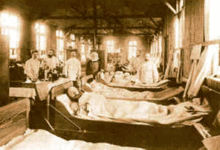| Revision as of 00:10, 13 May 2014 editValourless (talk | contribs)2 editsm Grammatical & SpellingTag: gettingstarted edit← Previous edit | Revision as of 05:08, 19 November 2014 edit undo108.41.160.197 (talk)No edit summaryNext edit → | ||
| Line 10: | Line 10: | ||
| Prior to this time, many physicians believed the disease was caused by direct exposure to the products of filth and decay. Koch helped establish that the disease was more specifically ] and was transmitted by exposure to the feces of an infected person, including through contaminated water supply. | Prior to this time, many physicians believed the disease was caused by direct exposure to the products of filth and decay. Koch helped establish that the disease was more specifically ] and was transmitted by exposure to the feces of an infected person, including through contaminated water supply. | ||
| ==Mark Twain== | |||
| American author ], an avid traveler, visited Hamburg during the cholera outbreak, and he described his experience in an short, uncollected piece dated "1891-2." Therein, he notes alarmingly the lack of information in Hamburg newspapers about the cholera event, particularly death totals. He also criticizes the treatment of the poor, as many, Twain says, were getting "snatched from their homes to the pest houses," where "a good many of them ... die unknown and are buried so." Twain concludes by lamenting the lack of awareness worldwide, especially in America. <ref>{{cite book|last=Blount|first=RoyK.|title=A tramp abroad. Following the equator: other travels |year=2010|publisher=Library of America.|location=New York|page=1145}}</ref> | |||
| ==See also== | ==See also== | ||
Revision as of 05:08, 19 November 2014



The fifth cholera pandemic (1881–96) was the fifth major international outbreak of cholera in the 19th century starting in India. It spread throughout Asia and Africa, and reached parts of France, Germany, Russia, and South America. The 1892 outbreak in Hamburg, Germany was the only major European outbreak; about 8,600 people died in that city. Although many residents held the city government responsible for the virulence of the epidemic, it continued with practices largely unchanged. This was the last serious European cholera outbreak of the century.
Pope Leo XIII authorized the construction of a hospice inside the Vatican for afflicted residents of nearby Roman neighbourhoods. That building was torn down in 1996 to make way for construction of the Domus Sanctae Marthae.
Scientific debate
During the pandemic, Robert Koch isolated Vibrio cholerae and proposed postulates to explain how bacteria caused disease. His work helped to establish the germ theory of disease.
Prior to this time, many physicians believed the disease was caused by direct exposure to the products of filth and decay. Koch helped establish that the disease was more specifically contagious and was transmitted by exposure to the feces of an infected person, including through contaminated water supply.
Mark Twain
American author Mark Twain, an avid traveler, visited Hamburg during the cholera outbreak, and he described his experience in an short, uncollected piece dated "1891-2." Therein, he notes alarmingly the lack of information in Hamburg newspapers about the cholera event, particularly death totals. He also criticizes the treatment of the poor, as many, Twain says, were getting "snatched from their homes to the pest houses," where "a good many of them ... die unknown and are buried so." Twain concludes by lamenting the lack of awareness worldwide, especially in America.
See also
References
- "Cholera's seven pandemics". Canadian Broadcasting Corporation. December 2, 2008. Retrieved 2008-12-11.
The fifth pandemic originated in the Bengal region of India and swept through Asia, Africa, South America and parts of France and Germany. Cholera claimed 200,000 lives in Russia between 1893 and 1894; and 90,000 in Japan between 1887 and 1889. Quarantine measures for ships and immigrants based on the findings of the British physician, John Snow, prevented cholera outbreaks in Great Britain and the United States.
{{cite news}}: Cite has empty unknown parameter:|coauthors=(help) - J. N. Hays (2005). Epidemics and pandemics: their impact on human history. ABC-CLIO. ISBN 1851096582.
- "Domus Sanctae Marthae & The New Urns Used in the Election of the Pope", ewtn.com, Retrieved February 10, 2009
- Blount, RoyK. (2010). A tramp abroad. Following the equator: other travels. New York: Library of America. p. 1145.
| Cholera | |||||||||
|---|---|---|---|---|---|---|---|---|---|
| Bacteria | |||||||||
| Treatment |
| ||||||||
| Outbreaks |
| ||||||||
| History |
| ||||||||
| Cultural depictions | |||||||||
This medical article is a stub. You can help Misplaced Pages by expanding it. |